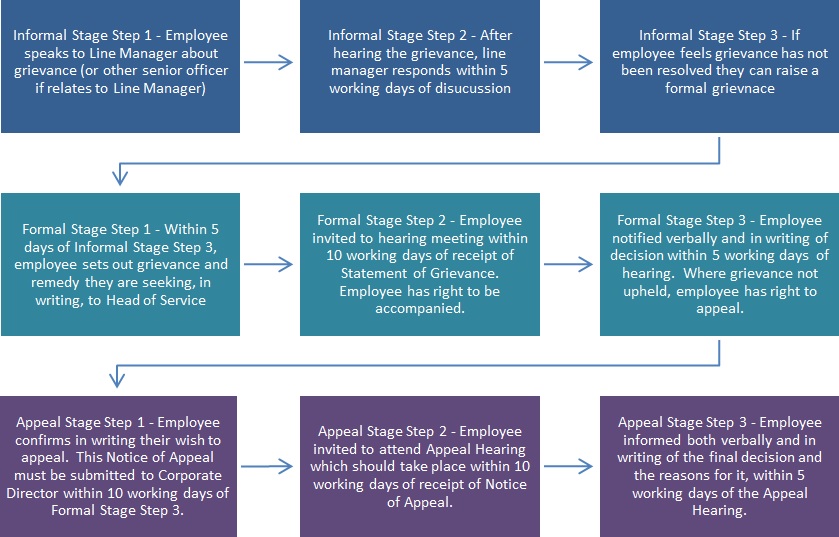Managing Grievances New Policy
Effective from 01.03.2022
The revised Managing Grievances policy is effective from 1.3.22 and requires to be used for all new grievance cases going forward from that date. The policy and the accompanying procedural guidance can be found under the link below.
Follow this link for full details: Policies for People (sharepoint.com)
Manging Grievances
Policy prior to 01.03.2022
Grievance cases that commenced prior to 1.3.22 require to continue to be administered and dealt with under the previous Managing Grievances policy and accompanying guidance which can be found on this People Anytime Portal page.
- Home
- /
- Employee Relations
- /
- Managing Grievances
A grievance is a problem or concern raised with management by an employee about their work, working conditions or relationships. The Council, has in place a procedure for employees to raise any problems or concerns without fear of criticism or reproach. The procedure is in accordance with the ACAS (Advisory, Conciliation and Arbitration Service) Statutory Code of Practice covering grievance procedures.
The Council recognises that it is good practice to deal with such issues impartially, quickly (within agreed timescales) and fairly using the same process. The matter will be handled in an open and constructive manner by a more senior manager in the service than the parties involved.
The Managing Grievances pages will guide employees and Managers through the process of raising and dealing with grievances.
Click here to view the Managing Grievances Procedure and Guidance
Overview
All grievances raised should be handled quickly, fairly, and confidentially to promote good working relations going forward.
Many grievances can be resolved informally before they become more serious and impact negatively upon working relationships.
If you feel that the grievance remains unresolved then it would proceed to the formal stage. It is at this stage that an employee can be supported by a work colleague or trade union representative.
Normal working arrangements will apply until all stages of the grievance process is concluded.
Process Overview

Who can raise a grievance?
Any current employee of the Council, regardless of status, can raise a concern through this process.
Collective grievances, raised by a group of employees, which form the basis of a dispute shall be brought through The Dispute Resolution Procedure. See the Framework Agreement for Industrial Relations (FAIR) for further details on this procedure.
Key Steps and Information
Click on the buttons below to take you through the key steps in managing grievances and further key information.
Informal Stage Formal Stage Appeals Process
Record Keeping Grievance FAQ's
Nature of the Grievance
Grievances about fellow employees
There may be occasions when an employee may be the cause of grievances among his/her colleagues. This could perhaps be on grounds of personal hygiene, attitude, or capability for the job.
This will need to be dealt with carefully, and sensitively, and will usually start with the relevant line manager talking privately to the employee concerned about the concerns expressed by colleagues.
Such counselling will hopefully resolve the grievance to the satisfaction of the colleagues who expressed concern on the basis that appropriate action has been taken to address the issue. Guidance on how to carry out counselling is contained within the management guidelines pertaining to Managing Discipline and equally applies in these circumstances.
However, if matters do not improve, then you will need to consider whether the grievance should be dealt with under the disciplinary procedure, in which case a disciplinary investigation would need to be initiated. Disciplinary action may eventually be required to address the problem, although that is strictly a matter for management through following the proper procedure.
Other Grievances
There may from time to time be other concerns that arise from junior employees against senior employees that do not fit the criteria to be a qualifying disclosure under the Council’s Whistleblowing policy but are of a whistleblowing nature. In these limited circumstances the junior employee can, if they wish, report their concern in writing to the Director of Corporate Governance (or other appropriate chief officer) who will arrange for the matter to be investigated and for a response to be given to the complainant.
You can not raise a Grievance about the following:
- Job grading
- Salary assigned to a job
- Disciplinary action being taken
- Performance management support
- Alleged Bullying & Harassment or Whistleblowing
- Pensions
- Income Tax or National Insurance
- Outcome sought is inherently unfair
You might also be interested in
Mediation Information for Employees
Counselling Service – Time for Talking
ACAS (Advisory, Conciliation and Arbitration Service)
Click here to return to the Employee Relations page.
Add a like and/or a rating below to indicate how useful you found this page.

You must be logged in to post a comment.